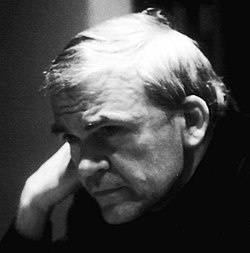Milan Kundera Quote
Let us define our terms. A woman who writes her lover four letters a day is not a graphomaniac, she is simply a woman in love. But my friend who xeroxes his love letters so he can publish them someday--my friend is a graphomaniac. Graphomania is not a desire to write letters, diaries, or family chronicles (to write for oneself or one's immediate family); it is a desire to write books (to have a public of unknown readers). In this sense the taxi driver and Goethe share the same passion. What distinguishes Goethe from the taxi driver is the result of the passion, not the passion itself.Graphomania (an obsession with writing books) takes on the proportions of a mass epidemic whenever a society develops to the point where it can provide three basic conditions: 1. a high degree of general well-being to enable people to devote their energies to useless activities; 2. an advanced state of social atomization and the resultant general feeling of the isolation of the individual; 3. a radical absence of significant social change in the internal development of the nation. (In this connection I find it symptomatic that in France, a country where nothing really happens, the percentage of writers is twenty-one times higher than in Israel. Bibi [character from the book] was absolutely right when she claimed never to have experienced anything from the outside. It is this absence of content, this void, that powers the moter driving her to write).But the effect transmits a kind of flashback to the cause. If general isolation causes graphomania, mass graphomania itself reinforces and aggravates the feeling of general isolation. The invention of printing originally promoted mutual understanding. In the era of graphomania the writing of books has the opposite effect: everyone surrounds himself with his own writings as with a wall of mirrors cutting off all voices from without.
Let us define our terms. A woman who writes her lover four letters a day is not a graphomaniac, she is simply a woman in love. But my friend who xeroxes his love letters so he can publish them someday--my friend is a graphomaniac. Graphomania is not a desire to write letters, diaries, or family chronicles (to write for oneself or one's immediate family); it is a desire to write books (to have a public of unknown readers). In this sense the taxi driver and Goethe share the same passion. What distinguishes Goethe from the taxi driver is the result of the passion, not the passion itself.Graphomania (an obsession with writing books) takes on the proportions of a mass epidemic whenever a society develops to the point where it can provide three basic conditions: 1. a high degree of general well-being to enable people to devote their energies to useless activities; 2. an advanced state of social atomization and the resultant general feeling of the isolation of the individual; 3. a radical absence of significant social change in the internal development of the nation. (In this connection I find it symptomatic that in France, a country where nothing really happens, the percentage of writers is twenty-one times higher than in Israel. Bibi [character from the book] was absolutely right when she claimed never to have experienced anything from the outside. It is this absence of content, this void, that powers the moter driving her to write).But the effect transmits a kind of flashback to the cause. If general isolation causes graphomania, mass graphomania itself reinforces and aggravates the feeling of general isolation. The invention of printing originally promoted mutual understanding. In the era of graphomania the writing of books has the opposite effect: everyone surrounds himself with his own writings as with a wall of mirrors cutting off all voices from without.
Related Quotes
About Milan Kundera
Kundera's best-known work is The Unbearable Lightness of Being. Before the Velvet Revolution of 1989, the country's ruling Communist Party of Czechoslovakia banned his books. He led a low-profile life and rarely spoke to the media. He was thought to be a contender for the Nobel Prize in Literature and was also a nominee for other awards.
Kundera was awarded the Jerusalem Prize in 1985, the Austrian State Prize for European Literature in 1987, and the Herder Prize in 2000. In 2021, he received the Golden Order of Merit from the president of Slovenia, Borut Pahor.
